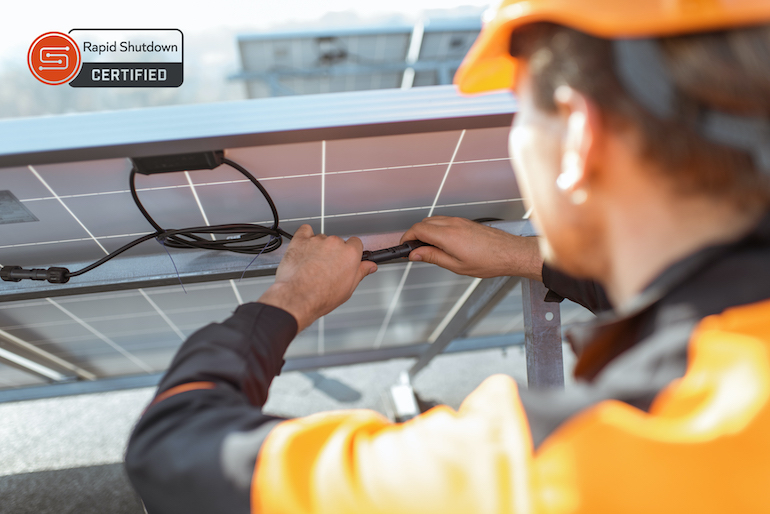North American Clean Energy
May 14, 2020
The SunSpec Alliance is pleased to report that six additional SunSpec members have announced products and services supporting the SunSpec Communication Signal for Rapid Shutdown standard, bringing the size of the SunSpec Rapid Shutdown ecosystem to 12 companies.
SunSpec Rapid Shutdown ecosystem participants include balance-of-system suppliers with stand-alone PV module-level initiators and transmitter products (APsystems, JMTHY, Midnite Solar, Stäubli and ZERUN); inverter manufacturers with integrated transmitters (Fronius, Ginlong and SMA); semiconductor companies (Texas Instruments) and SunSpec Authorized Testing Laboratories (CSA, Intertek and UL).
“With the addition of these influential companies, the SunSpec Rapid Shutdown ecosystem is stronger than ever and has increased capacity to promote safety and standardization across the distributed energy landscape,” said Tom Tansy, chairman of the SunSpec Alliance. “As more solutions come to market to help integrators comply with rapid shutdown requirements, these leaders are ensuring safe deployment of solar and storage systems in the U.S.”
Since it launched the SunSpec Communication Signal for Rapid Shutdown standard, the SunSpec Alliance has continued to hone and simplify the SunSpec Certification process and interoperability program. Important advancements include harmonizing test requirements with the UL 1741 standard and mobilizing a co-operative marketing and educational program to raise the visibility and awareness of SunSpec Rapid Shutdown solutions. SunSpec has also recently enhanced its local support capabilities for manufacturing partners in Asia.
With this ecosystem expansion, solar professionals have more choices and a wider range of cost-effective, standardized solutions to comply with rapid shutdown requirements. A total of nine product lines from six manufacturers have achieved SunSpec Certified status, adding to a list of 79 products from 56 companies that have achieved SunSpec Certified status so far.
TESTIMONIALS:
“The SunSpec Rapid Shutdown standard provides a communication platform for PV system module level rapid shutdown devices (MLRSD). APsystems develops MLRSD and transmitters certified to the SunsSpec standard. The products allow seamless integration and high reliability in solar systems with many inverters. This provides designers and installers the flexibility to optimize the system cost and performance. Since the standard unifies MLRSD communication and simplifies our design, APsystems can focus on optimizing product design and manufacturing to drive down the cost. The standard brings great value to the solar industry in safety, cost and performance.”
-Yuhao Luo, CTO, APsystems
“Fronius has been an early member of the SunSpec Alliance and is excited to see more industry standards emerge. SunSpec has a proven track record of successfully establishing industry standards, such as Modbus communications or smart inverter specifications. We were among the first ones to launch a product based on the new SunSpec Rapid Shutdown standard and are excited to see the ecosystem of products grow. Our belief is that industry standards support innovation to drive down cost and to allow customer choice.”
-Richard Baldinger, Head of Marketing and Inside Sales, Fronius
“The PowerStore, a preferred channel partner for Fronius, is pleased to support the SunSpec Alliance with industry standardized products for solar and storage professionals. We are a national distributor that offers manufacturer agnostic solutions and competitive pricing for many different NEC 2017 compliant and SunSpec compliant products and solutions. Our knowledgeable staff are NEC and NABCEP trained with the ability to offer design assistance to installers across the U.S.”
-Stewart White, Vice President, The PowerStore
“By using a SunSpec certified rapid shutdown device, SMA and our partners benefit from a best-in-class shutdown solution. Solar integrators can meet code, expedite installation, reduce component count for improved reliability, and eliminate risk associated with proprietary single-sourced alternatives. SunSpec has been a game-changer for SMA and our installers.”
-Brad Dore, Director of Marketing, SMA America
“The NEC 2017 Rapid Shutdown requirements add a significant level of complexity and new equipment in order to meet the prescribed operation parameters. The fact that these new components need to communicate with each other in order to function effectively leaves two realistic Rapid Shutdown system configurations: a fully proprietary solution supplied by a single manufacturer or a methodology that allows products from a multitude of suppliers to effectively and safely work together. The latter is by far the preferred situation as it allows manufacturers to focus on specific system components that can benefit most from their experience and technologies. This gives the designer/installer the most flexibility when specifying components for their PV systems, both from the point of cost optimizing and using their preferred equipment suppliers. This (realistically) can only happen if a robust, trusted, open-source communication format exists that all these manufacturers can rely on and build their components around. This is what makes the work of the Sunspec Alliance so invaluable. Because of its acceptance as the leader in standardization of industry practices, and the fact that it is a collaboration of industry experts and manufacturers, it positions them to be the best possible source for a standardized communication protocol.”
-Brian Mills, Product Manager, Alternative Energy, Stäubli
“Working with leading suppliers of rooftop solar systems for many years, we at Texas Instruments recognize the importance of an easy-to-implement and safe solution for rapid shutdown. We will continue to help SunSpec Alliance establish an open standard so solar companies can deploy safer and more effective designs.”
-Jose Sacripanti, Analog Marketing Manager, Texas Instruments
“In combination with the UL 1741 standards technical panel of experts, UL is the standards development organization that published safety requirements for PV Rapid Shutdown Systems (PVRSS) and PV Rapid Shutdown Equipment (PVRSE). These PVRSS and PVRSE requirements were added to UL 1741, 2nd edition, on December 22nd, 2017, to include safety requirements to reduce hazards for firefighters working near PV arrays. We applaud SunSpec’s success in this space. UL proudly works with SunSpec as an authorized test lab to test products to the SunSpec Rapid Shutdown Communication Standard. The combination of the SunSpec communication signal with the safety requirements of UL 1741 for PVRSS and PVRSE results in a powerful combination for implementation of PV systems.”
-Scott Picco, Business Development Manager, UL LLC
SunSpec Alliance | http://www.sunspec.org


